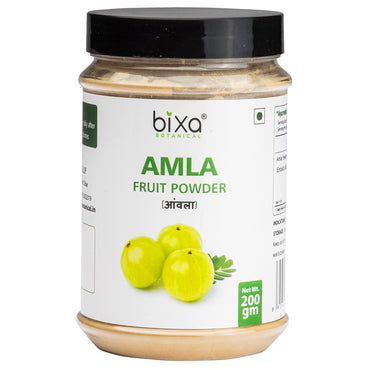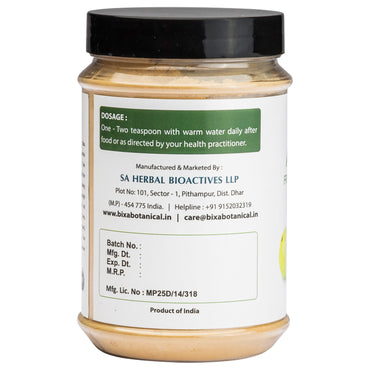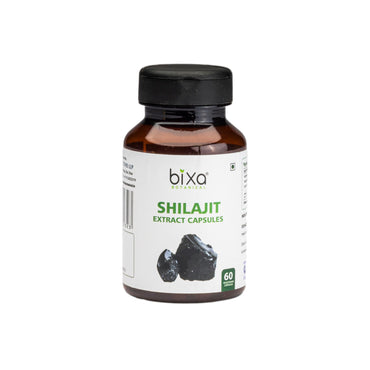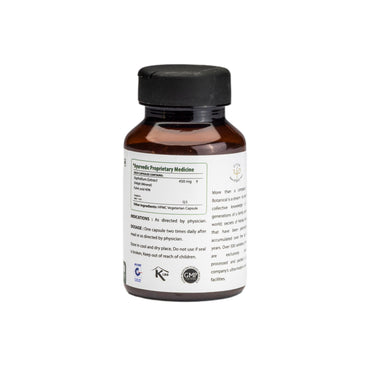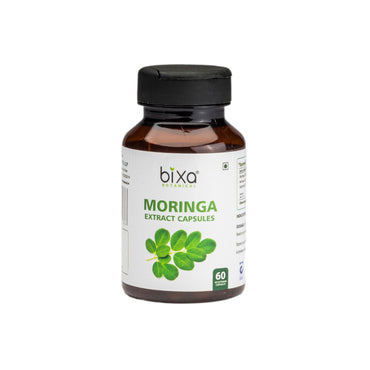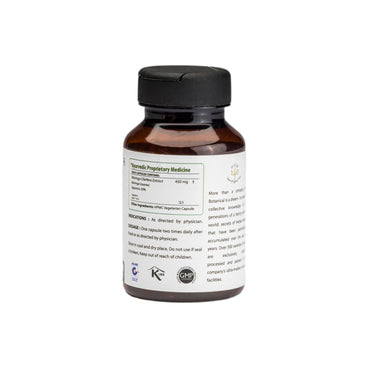
₹ 325.00
₹ 345.00
Supports as Natural VIT C Supplement Supports as Anti-Oxidant & helps in damaged cells repair. Supports cardiac health & low bad cholesterol levels. Supports boost in Immunity and high energy in weak body. Amla known as Indian gooseberry (Botanical name – Emblica Officinalis ) is very important and largely used herb in Ayurvedic medicinal formulations. It grows throughout India, bears sour-tasting gooseberry-like fruits & is also known by the Sanskrit name "Amalaki." In Sanskrit other nicknames for amla have meaning "mother," "nurse," and "immortality"—which proves healing capacity of its fruits. Amla as per Ayurveda has Vitiated Tridosha (Vatta, Pitta, Kapha) pacifying capacity; especially it prevents excessive formation & accumulation of Pitta. Amla helps to flush toxins & rejuvenates all of the tissues in the body and re-energize ojas, the essence of immunity and youthfulness. Amla helps for digestion in macro & micro levels and in the absorption of important nutrients...
Supports as Natural VIT C Supplement Supports as Anti-Oxidant & helps in damaged cells repair. Supports cardiac health & low...
₹ 599.00
₹ 740.00
Supports Strength, Stamina & Healthy Libido Helpful as Natural General Tonic & Rejuvenator. Helpful to normalise blood sugar levels Contains Fulvic acid, helpful to absorb Vitamins & Nutrients Lab tested for quality, Non-GMO, vegan & gluten free Shilajit Extract Capsule (Asphaltum) is as per Ayurvedic science, exudates from Rocky Mountains especially Himalayas, very Useful to Increase Vigour, Vitality, Stamina & Strength. As Rocky Mountains along with minerals get overheated by consistent Sunrays, multiple minerals liquefy and exudates like resins or gums from plants, it is collected and purified.This exudate is also known as Shilajeet or Shilajatu or Mineral pitch and usually exudates from Himalayan Range of Mountains (Between India & Nepal) is collected. An ancient authentic Ayurvedic text, called the Charaka Samhita, states that there is no curable disease in the universe, which is not effectively cured by Purified Shilajit when it is administered at the appropriate time. In Sanskrit...
Supports Strength, Stamina & Healthy Libido Helpful as Natural General Tonic & Rejuvenator. Helpful to normalise blood sugar levels Contains...
₹ 499.00
₹ 552.00
Great source of energy and stamina. Useful For Joint pain & General Nutrition Supports removal of blockages in blood and normal heart circulation. It helps to improve digestion and absorption of nutrition from food. Contains Anti-oxidants, essential nutrients & is useful for blood circulation. Lab tested for quality, Non-GMO, vegan & gluten free Moringa (commonly known as drum stick, horse radish, sohanjana, shigru, botanical name – Moringa oleifera) is a plant that is native to the sub-Himalayan areas of India, Pakistan, Bangladesh, and Afghanistan. Shigru is also grown in the tropics. The leaves, bark, flowers, fruit, seeds, and root are used to make medicine.Ayurveda mentions that Moringa is useful in pacifying Vitiated kapha/vata, promotes adequate blood flow to heart muscles & low blood lipid levels. Ayurveda says, by virtue of its properties of Tikshna (penetrating) & Ushna (hot) it supports healthy digestion and non accumulation of waste materials, toxins &...
Great source of energy and stamina. Useful For Joint pain & General Nutrition Supports removal of blockages in blood and...
-
Previous
- Page 1 of 1
-
Next
Description
NUTRITIONAL WELLNESS:
Good nutrition is one of the keys to a healthy life. You can improve your health by keeping a balanced diet. You should eat foods that contain vitamins and minerals. This includes fruits, vegetables, whole grains, dairy, and a source of protein. Find the strengths and weaknesses in your current diet. Do you eat 4-5 cups of fruits and vegetables every day? Do you get enough calcium? Do you eat whole grain, high-fiber foods? If so, you’re on the right track! Keep it up. If not, add more of these foods to your daily diet.Keep track of your food intake by writing down what you eat and drink every day. This record will help you assess your diet. You’ll see if you need to eat more or less from certain food groups. Think about asking for help from a dietician. He or she can help you follow a special diet, especially if you have a health issue. Balanced nutrition and regular exercise are good for your health. These habits can help you lose or maintain weight. Try to set realistic goals. They could be making some of the small diet changes listed above or walking daily. Doctors and dieticians suggest making healthy eating habits a part of daily life rather than following fad diets. Nutrition tips and diets from different sources can be misleading. Fad diets aren’t the answer. Fad or short-term diets may promise to help you lose weight fast. However, they are hard to keep up with and could be unhealthy. Good nutrition doesn’t come in a pill. Try eating a variety of foods instead. Your body benefits most from healthy whole foods. Only take vitamins that your doctor prescribes. Diet programs or products can confuse you with their claims.
While some extreme diets may suggest otherwise, we all need a balance of protein, fat, carbohydrates, fiber, vitamins, and minerals in our diets to sustain a healthy body. You don’t need to eliminate certain categories of food from your diet, but rather select the healthiest options from each category.
- Protein gives you the energy to get up and go—and keep going—while also supporting mood and cognitive function.
- Fat: Not all fat is the same. While bad fats can wreck your diet and increase your risk of certain diseases, good fats protect your brain and heart. In fact, healthy fats—such as omega-3s—are vital to your physical and emotional health. Including more healthy fat in your diet can help improve your mood, boost your well-being, and even trim your waistline.
- Fiber: Eating foods high in dietary fiber (grains, fruit, vegetables, nuts, and beans) can help you stay regular and lower your risk for heart disease, stroke, and diabetes. It can also improve your skin and even help you to lose weight.
- Calcium: As well as leading to osteoporosis, not getting enough calcium in your diet can also contribute to anxiety, depression, and sleep difficulties. Whatever your age or gender, it’s vital to include calcium-rich foods in your diet, limit those that deplete calcium, and get enough magnesium and vitamins D and K to help calcium do its job.
- Carbohydrates are one of your body’s main sources of energy. But most should come from complex, unrefined carbs (vegetables, whole grains, fruit) rather than sugars and refined carbs. Cutting back on white bread, pastries, starches, and sugar can prevent rapid spikes in blood sugar, fluctuations in mood and energy, and a build-up of fat, especially around your waistline.
- What is moderation? In essence, it means eating only as much food as your body needs. You should feel satisfied at the end of a meal, but not stuffed. For many of us, moderation means eating less than we do now. But it doesn’t mean eliminating the foods you love. Try not to think of certain foods as “off-limits.” When you ban certain foods, it’s natural to want those foods more, and then feel like a failure if you give in to temptation. Start by reducing portion sizes of unhealthy foods and not eating them as often. As you reduce your intake of unhealthy foods, you may find yourself craving them less or thinking of them as only occasional indulgences.
- Take your time: It’s important to slow down and think about food as nourishment rather than just something to gulp down in between meetings or on the way to pick up the kids. It actually takes a few minutes for your brain to tell your body that it has had enough food, so eat slowly and stop eating before you feel full.
- Eat with others whenever possible: Eating alone, especially in front of the TV or computer, often leads to mindless overeating.
- Limit snack foods in the home: Be careful about the foods you keep at hand. It’s more challenging to eat in moderation if you have unhealthy snacks and treats at the ready. Instead, surround yourself with healthy choices and when you’re ready to reward yourself with a special treat, go out and get it then.
- Control emotional eating: We don’t always eat just to satisfy hunger. Many of us also turn to food to relieve stress or cope with unpleasant emotions such as sadness, loneliness, or boredom. But by learning healthier ways to manage stress and emotions, you can regain control over the food you eat and your feelings.
- Add more fruit and vegetables to your diet: Fruit and vegetables are low in calories and nutrient dense, which means they are packed with vitamins, minerals, antioxidants, and fiber. Focus on eating the recommended daily amount of at least five servings of fruit and vegetables and it will naturally fill you up and help you cut back on unhealthy foods. A serving is half a cup of raw fruit or veg or a small apple or banana, for example. Most of us need to double the amount we currently eat.
FAQ's
Q. What are Herbal powders?
The useful part of Herbs or medicinal plant is selected, dried, powdered & sieved to 40 or 60 mesh. They can be easily stored and transported.
Q. How effective are Herbal Powders?
They are very effective and fast acting if taken as recommended for particular illness and in correct dosage, as suggested by health practitioner. The result may be seen within 5-7 days.
Q. What is the Shelf life of Herbal Powders?
Generally dried powdered herbs if stored properly never get spoiled or damaged. They may be less effective after 5 years of manufacturing.
Q. What are the importance of Herbal medicines?
Herbal medicines are derived from Natural, Pure Herbs with Natural origin. They work as per their content of natural, pure Bio-active substances (Glucosides), which are not chemicals and
not artificially induced! Hence no side-effects of Herbal Medicines, if taken in recommended dosage and for specific illness, Like – Moringa Powder is very good for Nutritional Wellness.
Q. Can you make tea from powdered herbs?
Teas can be made by pouring 1 cup of boiling water over 1–2 teaspoons of dried herbs. Cover and let tea steep for 5 minutes or so (roots and bark take longer). Then filter or decant the upper Tea solution and drink.
Q. How you can say, you have Nutritional wellness?
If you are having regular motions daily, feel energetic after 4-5 hours of eating, your appetite is good, your muscles strength is good, you have good stamina, your physical energy is excellent, your blood vitamins level
are good, then you can say that you have Nutritional wellness!
Q. How you can judge that you should go for Nutritional deficiency check?
If you have regular giddiness, lethargy in walking & doing regular routine work, having intermittent black outs, mild muscle weakness, lack of physical & mental energy, tingling sensation in limbs, frequent mouth ulcers,
irregular bowl habits, low in stamina – are the signs that you should go for Nutritional wellness Check up!
Q. How to achieve your Nutritional wellness?
Maintain your bowl habits, have a good diet (under the supervision of dietician), eat under moderation, take your time for having food, eat food with others & in happy mood, eat food rich in proteins, vitamins, Fiber,
minerals, omega oils etc, take Nutritional Herbal supplements (under physician supervision), have a regular schedule for exercise, sleep and Me-time.
Q. Herbs good for Nutritional Wellness?
Moringa, Noni, Amla, Shilajit, Pomegranate, Garden cress, Chia seeds.


